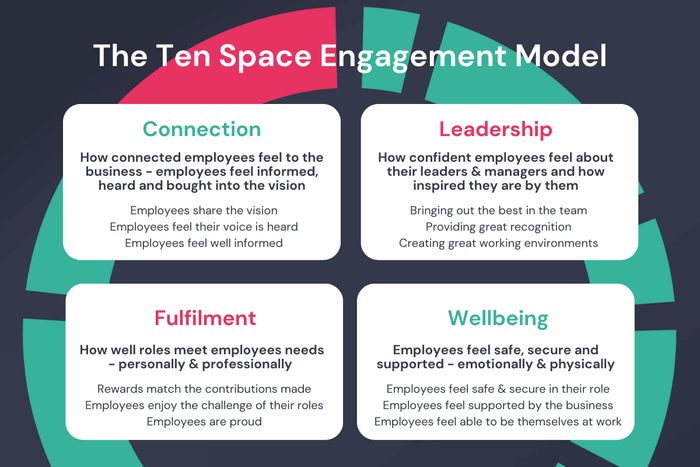You're here reading this page. That probably means you're planning to run an employee survey and you're not sure what questions you need to ask.
At Ten Space, this is something we see all the time and we work with our clients to make sure that they are asking the best employee survey questions and that what they ask is not just generic, but will help them to get to the heart of their business needs.
Before you start
You need to think about your objectives for your employee survey, what you already know, what you would like to know and if there are any things that you don't want to know. It may sound odd, but asking questions in your staff survey where you know you won't be able to take any action or do anything with the responses can often be more damaging than not asking in the first place.
You should also think about what you're going to do with your results. Have a plan on how your going to decide what actions to take an who will be responsible for making sure they happen. Running an employee survey with great questions that result in no (visible) action is a great way to damage morale in your organisation, so to make the most of your staff survey set yourself up with targets on how you're going to respond to the insight you get.
Finally, you really need to think about communicating with your organisation. Your survey will only be a success if people know about it and understand why they should take part. Handily, you can download our free guide to help you build your employee communications plan to make your staff survey a real success.
(don't) Ask all the things!
We often work with clients who want to ask a lot of questions. We're strong believers (backed up by our own completion stats) that keeping surveys short gives a much better experience for the participant, gives you higher completion rates and reduces survey fatigue - where participants give unthoughtful, poor-quality answers just to get to the end of the survey. Our rule-of-thumb is to aim for 10-15 questions in a survey and to keep the time needed to complete the survey down to no more than 5-10 minutes.
Remember - if there is something that you find out in your survey that you want to know more about, you can always do another more focused survey later, asking questions just about that area!
If you've got a long list of things you want to know in the survey, that's great but ask yourself the question:
If I could only get the answer to one question, what would that question be?
If you answered that with 2-3 things instead of one, that's OK too! But now you know more about your priorities.
Pillars and Grouping
We often find that questions can be related. Often to more than one thing. Many organisations have "values" that they would want to track things against.
At Ten Space, we often advocate tying questions back to a combination of your values and the pillars of our employee engagement model which helps you to focus on the key drivers that help you to understand and motivate staff.
The Killer Questions
Now we know the basics, let's look at the 10 questions that you should consider including in your next employee survey.
Q1: How likely are you to recommend [your organisation] as a place to work to a friend or family?
You may recognise this question from a lot of customer satisfaction surveys. This is the Employee NPS (eNPS) question - you can read more about it here, but in summary it is a derivation of the NPS question aimed at understanding the "loyalty" of your employees. We find that it is a great "opener" question that you can use to get a good feel for the overall level of engagement of your workforce and we often recommend including it in all of your surveys to help you to track, measure and compare sentiment at all times.
The Employee NPS question is great for understanding the amount of "detractors" who are at risk of leaving, or worse, actively inciting others to leave vs those "promoters" who are your greatest fans.
Q2: "I am proud to work at [your organisation]?"
Although this is quite similar in many ways to the eNPS question, you can use this to help understand how well your staff align with your organisation's values and culture. Poor scoring in this area often indicates that you either have issues with your organisation's culture, but can often also indicate challenges with communication and leadership.
At Ten Space, we link this question to the Connection pillar of our employee engagement model.
Q3: "I feel supported by my manager?"
The support of a good manager can make or break an employee's experience in the workplace. Although senior leaders set the overall tone for the organisation, the every-day interactions of line managers is often what matters most to employees. If employees aren't feeling supported by their manager, there may be issues with the culture or possibly ability of managers.
Because a single manager typically has an impact on several staff, working with the manager to improve the support they provide can pay back in multiples.
At Ten Space, we link this question to the Leadership pillar of our employee engagement model.
Q4: "I have opportunities and support to further my career"
Most people have aspirations to improve themselves and change what they do over time. The details are different for everybody, but where staff don't have the support or opportunities to grow, they can often become de-motivated, dis-engaged and underperform.
At Ten Space, we link this question to the Fulfilment pillar of our employee engagement model.
Q5: "Team members at [your organisation] are recognised for doing a good job"
When somebody does a good job, if they don't feel that their work has been recognised, it can be taken as a big signal that they aren't valued. Undervalued employees are often less engaged and harder to retain or motivate.
Recognition can come in many different ways. Sometimes this may be a public celebration and award from a senior leader (although for some people that can easily backfire - it is important to know how individuals would prefer to be recognised). Other times, this might be a reward like a gift card. A simple "thank you" when somebody has done a good job can go a surprisingly long way!
At Ten Space, we link this question to the Leadership pillar of our employee engagement model.
Q6: "I understand how the work I do fits with the goals of [your organisation]"
To get the most out of the team, it is best if everybody is pulling in the same direction... and everybody knows which direction to pull in! As the now-classic tale of the NASA janitor explaining to the President of the USA that he was helping to put a man on the moon shows, when everybody knows how their actions impact the organisation's goals, the motivational impact can be immense. Equally, not understanding that link can have a substantial de-motivating effect.
This question can flag opportunities to improve communication and opportunities to reinforce goal-setting at all levels.
At Ten Space, we link this question to the Connection pillar of our employee engagement model.
Q7: "I find the vision at [your organisation] motivating"
Here we're really asking two questions:
- Do you know what the organisation's vision is (and has it been well communicated)?
- Does it align with the things that work well for you?
Employees who don't know what the vision for the organisation is certainly can't be expected to do their best at contributing toward achieving it. And if they do know what it is, but it doesn't align well with their personal motivations, they won't want to do their best work.
Understanding how impactful the vision is gives you a great place to start with making sure that people are better aligned and able to perform at their best.
At Ten Space, we link this question to the Fulfilment pillar of our employee engagement model.
Q8: "I am informed about what is happening"
We've said it before and we'll say it again. Communication is critical. When people feel in the dark, or that they don't know what is happening, they will form their own ideas and act on those ideas. At best, that can lead to a lack of focus on what really matters and at worse it can build a toxic culture of mistrust, apathy or even actively harmful actions.
At Ten Space, we link this question to the Connection pillar of our employee engagement model.
Q9: "My manager cares about my needs as an individual"
Fostering a strong relationship between manager and team member is a critical part of maintaining a positive and healthy relationship between the employee and the organisation. Beyond the expected "tasking" responsibilities, good managers provide a pastoral element to their team. This helps improve trust and motivation. When a team member feels that their manager doesn't care, they're more likely to be less forthcoming and less likely to "go the extra mile" when needed.
At Ten Space, we link this question to the Wellbeing pillar of our employee engagement model.
Q10: "What 3 words would you use to describe [your organisation]"
This open-ended question can often be a good eye-opener. When you ask this question of employees, you should take a look at the organisation's values and see how well those words align... and where there is mis-alignment, that probably tells you that the values stated aren't the same as those that employees feel on a day-to-day basis.
Use the answers here to help check that your culture is really what you think it is and what you think it should be!
Conclusions
That's a list of 10 employee survey questions that we at Ten Space commonly use as inspiration with our clients in their employee surveys. Every organisation is different and has different needs, so you shouldn't stop there. There will certainly be questions you need to add in that are specific to things going on in your organisation!
At Ten Space we work closely with our clients to make sure we understand what is different with their organisation and help them build the right set of questions for their staff survey. Why not contact us to see how we could help you?







